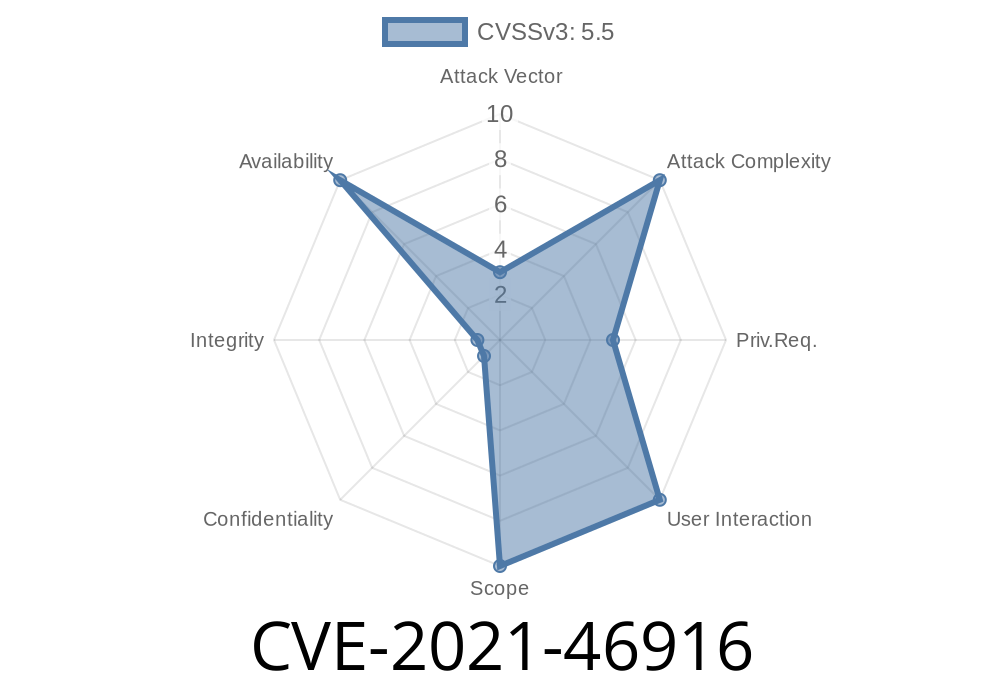In early 2021, security researchers identified a vulnerability in the Linux kernel affecting the ixgbe network driver—one of the widely used drivers for Intel(R) 10 Gigabit PCI Express network adapters. This post aims to break down the issue (CVE-2021-46916), explain the underlying code mistake, and discuss how it was fixed.
What is CVE-2021-46916?
CVE-2021-46916 is a NULL pointer dereference bug discovered in the ixgbe driver’s handling of the ethtool loopback test. In simple terms, the code tried to access data at a memory address that wasn't properly initialized, leading to a system crash—otherwise known as a kernel panic.
The Vulnerable Code
The ixgbe driver allows administrators to run various hardware tests using ethtool, including a loopback test. During this test, the driver sets up "test rings" (temporary queues for traffic), but does not attach hardware interrupt handlers to them.
The problem arose in this flow
- The test ring is created without a q_vector (an object connecting the ring with interrupt/NAPI handling).
Here’s a simplified example derived from the problematic logic
static int ixgbe_get_napi_id(struct ixgbe_ring *ring)
{
// old code: assumes q_vector is never NULL
return ring->q_vector->napi.napi_id;
}
If ring->q_vector is NULL, trying to access napi.napi_id crashes the kernel.
The Fix
The fix is straightforward: add a NULL check for q_vector before accessing its fields. If q_vector is absent, return a safe default value (such as zero).
Patched Code Snippet
static int ixgbe_get_napi_id(struct ixgbe_ring *ring)
{
if (!ring->q_vector)
return ; // Safely handle missing q_vector
return ring->q_vector->napi.napi_id;
}
With this change, running the ethtool loopback test no longer causes a crash, even if the test ring wasn't set up with interrupt handling.
How Was This Exploited?
There’s no public remote exploit; this bug mainly allowed local users (such as administrators or users with sudo rights) to crash the system by running:
sudo ethtool -t eth
(Replace eth with the name of an affected Intel interface.)
If you needed high availability or ran customer workloads, this bug was a risk: anyone with the right access could cause downtime.
References
1. Original Linux Kernel Commit
2. CVE Details for CVE-2021-46916
3. ixgbe driver docs
4. Commit discussion thread
Takeaways for Admins and Developers
- Always check for NULL before accessing pointer members in kernel code, especially for structures created only for temporary use or test paths.
- Update your kernel and drivers regularly: This patch was included in Linux versions after February 2021.
Bottom Line
CVE-2021-46916 is a great example of how even mature, critical driver code can contain simple but risky bugs. A careful NULL pointer check is sometimes the difference between reliability and a crash that takes your server offline.
Stay updated, stay secure! If you run large Linux fleets with Intel 10G adapters, make sure your kernels include this fix.
If you want to read the original commit and code diff, check it out here:
🔗 Patch on kernel.org
*Written exclusively for you, in clear language. If you have additional questions about CVE-2021-46916, reply below!*
Timeline
Published on: 02/27/2024 07:15:08 UTC
Last modified on: 04/10/2024 14:24:11 UTC
